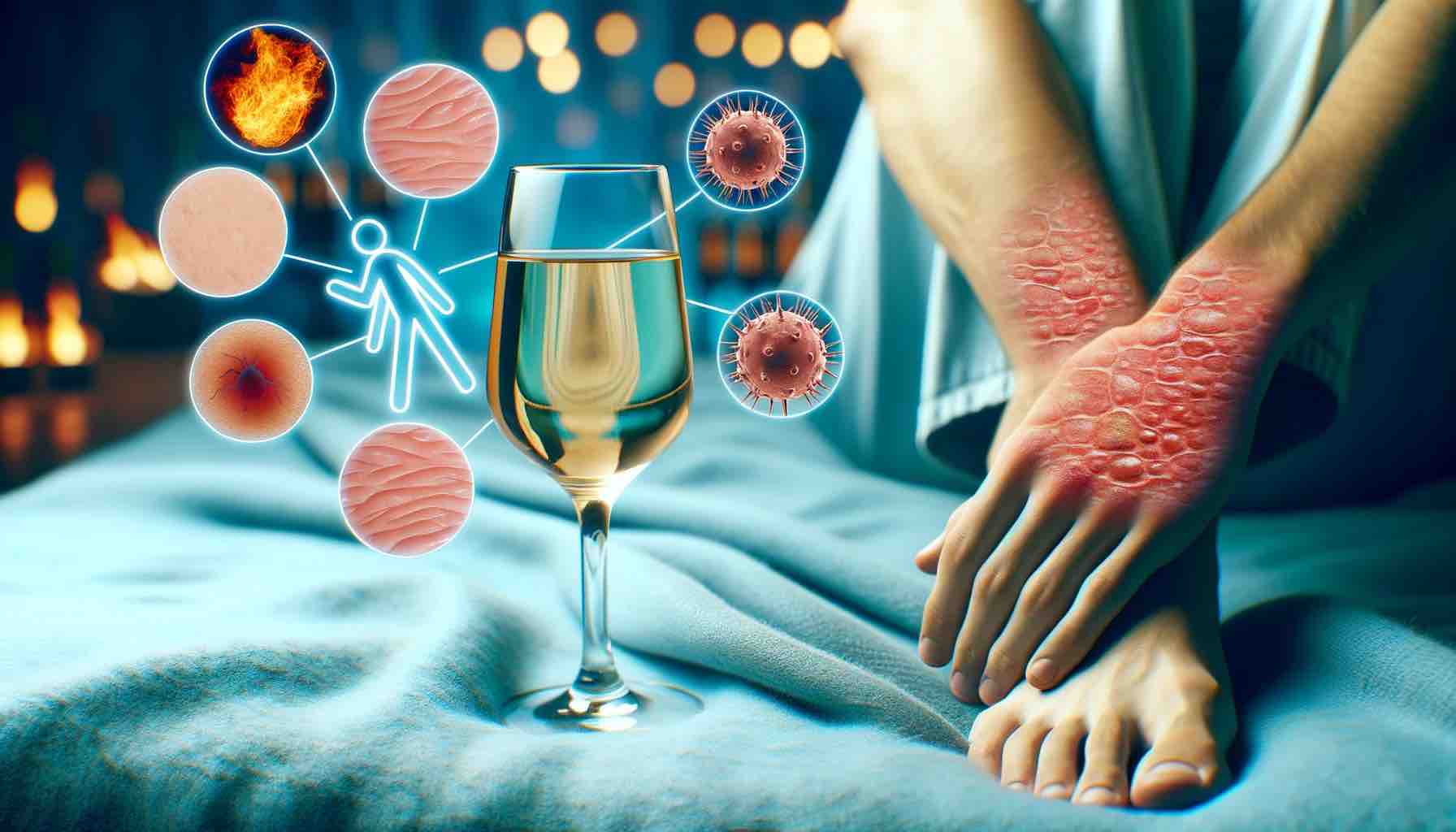
Introduction
Navigating through life with eczema can be a challenging journey, filled with a continuous search for triggers and effective management strategies. Eczema, or atopic dermatitis, is a prevalent skin condition marked by inflamed, itchy, and often painful skin lesions. Various environmental factors, including allergens, irritants, and lifestyle choices such as alcohol consumption, play a significant role in the manifestation and exacerbation of eczema symptoms. This article delves deeply into understanding the intricate relationship between alcohol and eczema, aiming to provide comprehensive insights to help individuals make informed decisions regarding alcohol consumption in the context of managing eczema.
Alcohol as a Potential Eczema Trigger
Alcohol is omnipresent in social gatherings and relaxation rituals, but it might not be the best companion for individuals with eczema. Alcohol can act as an eczema trigger, ushering in a cascade of reactions that might exacerbate the skin’s condition. Here’s a closer look at how alcohol might influence eczema:
Dehydration and Skin Barrier Disruption
Alcohol possesses diuretic properties, promoting fluid loss and leading to dehydration. Adequate hydration is paramount for skin health, and the lack thereof can result in dry, flaky, and irritated skin, which is a precursor to eczema flare-ups. Furthermore, alcohol consumption can compromise the skin’s barrier function, making it more susceptible to irritants and allergens.
Inflammation and Immune System Response
Alcohol can instigate inflammatory responses in the body. Inflammation is a cornerstone of eczema, and the introduction of alcohol can amplify this, leading to heightened skin redness, itching, and discomfort. Additionally, alcohol might modulate the immune system’s responses, potentially influencing the severity and frequency of eczema flare-ups.
- Dehydration: Alcohol is a diuretic, which means it can lead to increased water loss, contributing to dry and irritated skin.
- Inflammation: Alcohol can promote inflammation in the body, which might worsen eczema symptoms.
- Immune System: Alcohol can impact the immune system’s functionality, potentially affecting the skin’s ability to heal and regenerate.
Dissecting the Impact of Different Alcoholic Beverages
Not all alcoholic beverages impact eczema equally. Various components, such as preservatives, additives, and natural ingredients in these beverages, can influence their effect on eczema.
- Beer: Often rich in gluten and other potential allergens, beer might not be the most eczema-friendly option. The yeast and other ingredients in beer might also contribute to its potential to trigger eczema symptoms.
- Wine: Wine, particularly red wine, is laden with histamines and sulfites, notorious for their potential to instigate allergic and sensitivity reactions, possibly leading to eczema flare-ups.
- Spirits like Vodka: Spirits undergo extensive distillation and purification processes, potentially making them slightly more tolerable. However, they are still potent, and their high alcohol content can be harsh on the skin.
Considerations and Adaptations for Managing Eczema
For those grappling with eczema, mindful consideration of alcohol consumption is essential. Moderation is key, and understanding one’s own triggers is crucial. Hydration should be prioritized to combat the dehydrating effects of alcohol. Choosing alcoholic beverages that are purer and contain fewer additives and irritants might also be beneficial.
- Moderation: If you choose to consume alcohol, doing so in moderation is advisable.
- Hydration: Ensure you are well-hydrated before and after consuming alcohol to counteract its dehydrating effects.
- Choice of Alcohol: Opt for alcoholic beverages that are less likely to trigger your eczema. You might find that some drinks are more tolerable than others.
Food and Eczema: Nourishing the Skin from Within
Eczema, or atopic dermatitis, is not just a surface-level condition. It’s a reflection of internal imbalances, often closely tied to what we consume. The foods we eat can either aggravate or alleviate eczema symptoms, making dietary choices a crucial part of managing this skin condition. In this section, we will explore the intricate relationship between food and eczema, featuring insights from various resources that delve deeply into this topic.
Foods to Avoid for Eczema: Insights from Gut Health Expert Dr. Chanu Dasari, MD
In this insightful resource, Dr. Chanu Dasari shares his expertise on the foods that tend to exacerbate eczema symptoms. Understanding and avoiding these triggers is a fundamental step in managing eczema more effectively.
Healing Eczema Naturally
Explore natural ways to heal eczema, focusing on holistic approaches and dietary adjustments that can help manage symptoms. This resource provides a broader perspective on how natural remedies, including specific foods, can play a role in eczema management.
The Impact of Dairy on Eczema
Dairy is a common dietary trigger for eczema. This article delves into the relationship between dairy consumption and eczema flare-ups, providing valuable insights for those considering dietary adjustments to manage their symptoms.
The Role of Sugar in Eczema
Sugar can be an inflammatory ingredient for many, especially those dealing with eczema. Discover how sugar impacts eczema and learn about alternative sweetening options that are more skin-friendly.
Exploring the Eczema and Gluten Connection
Gluten can be a hidden culprit behind eczema flare-ups. This resource explores the potential link between gluten and eczema, guiding those considering a gluten-free approach to managing their symptoms.
Alcohol and Eczema: Understanding the Connection
Alcohol consumption can influence eczema symptoms. Learn more about how alcohol interacts with eczema and what considerations to keep in mind regarding alcohol intake.
Conclusion
The intersection of alcohol and eczema is complex, influenced by various factors including the type of alcohol consumed and individual sensitivities. By cultivating a deeper understanding of this relationship, individuals with eczema can navigate their choices with greater awareness and mindfulness, fostering better management of their skin condition.
FAQs
- What is the relationship between alcohol consumption and eczema flare-ups? Alcohol can potentially exacerbate eczema symptoms due to its dehydrating effects and its ability to trigger inflammatory responses in the body. The type of alcoholic beverage and individual sensitivities also play a role in how alcohol might affect eczema.
- Are certain types of alcoholic beverages more likely to cause eczema flare-ups? Yes, beverages like beer and wine, which contain more histamines, sulfites, and other potential allergens, are often more likely to trigger eczema symptoms compared to purer spirits like vodka.
- How does alcohol affect the skin’s hydration in relation to eczema? Alcohol acts as a diuretic, promoting fluid loss and leading to dehydration. For individuals with eczema, this can result in drier skin, making the skin more susceptible to irritants and allergens.
- Can moderate alcohol consumption still affect eczema? Even moderate alcohol consumption can influence eczema by affecting the skin’s barrier function and hydration levels. Individual tolerance varies, and some might find that even small amounts of alcohol can trigger their symptoms.
- Is there a way to consume alcohol without triggering eczema symptoms? While there’s no one-size-fits-all answer, choosing alcoholic beverages with fewer additives, ensuring adequate hydration, and consuming alcohol in moderation may help in managing the potential triggering of eczema symptoms.
- Does the type of alcohol in beverages make a difference in eczema reactions? The type of alcohol, along with the other ingredients present in the beverage, can influence its impact on eczema. Spirits, due to their distillation process, might be slightly more tolerable.
- How does alcohol-induced inflammation affect eczema? Alcohol can promote inflammatory responses in the body, which can exacerbate the inflammation already present in eczema, potentially worsening the symptoms.
- Is it advisable to avoid alcohol completely if one has eczema? Avoidance depends on individual triggers and tolerance. For some, avoiding alcohol might help in better managing eczema, while others might not notice a significant impact.
- Can alcohol affect the effectiveness of eczema treatments? Alcohol might interact with certain medications and can also affect the skin’s ability to heal and respond to treatments, potentially influencing the effectiveness of eczema management strategies.
- What are some strategies to minimize the impact of alcohol on eczema? Strategies include choosing beverages with fewer irritants, maintaining hydration, limiting consumption, and being mindful of individual triggers and sensitivities.
Blog Tags
eczema, alcohol, skin inflammation, eczema triggers, dehydration, eczema management, alcoholic beverages, skincare












